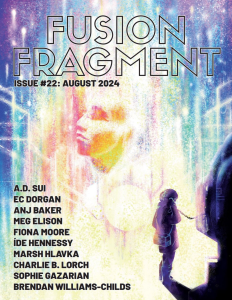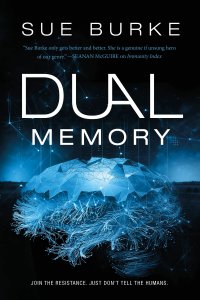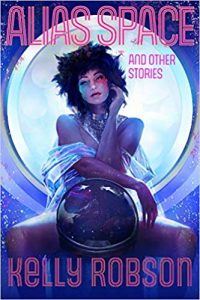Cast of Wonders, Strange Horizons, and Fusion Fragment: Short Fiction Reviews by Charles Payseur
 Cast of Wonders 8/24/24
Cast of Wonders 8/24/24
Strange Horizons 8/19/24, 8/26/24
Fusion Fragment 8/24
Cast of Wonders also closed out August strongly with J.M. Bueno’s haunted house story, “Double Yellow Lines”. Unlike many that use the element, this story’s haunted house isn’t nearly as malevolent as it could be. Instead, it seems to be a way for people metaphorically haunted by the past and their own grief to try and confront physically what is at the root of their anguish. For Raleigh, the house provides the visage of Charles, who acts as her host during the time of her stay. That the relationship here is transactional is interesting, the house and Charles part haunting, part therapy as they bring Raleigh’s past viscerally back into the present. Bueno captures the foreboding and tension of a horror story, using a literal haunting to show that often it’s the psychological demons that are harder to banish than the paranormal ones. It’s a sharp and effective read.
August saw a number of fabulous poems from Strange Horizons, including Jonathan Olfert’s “One Large Deep Fried Thistle Burr”, which imagines a future where plants have become deadly unless cooked thoroughly. It’s something that obviously changes how people eat and prepare food, with new artificial fruits and vegetables made from meat and a deep yearning to be able to once more bite into a raw apple or tomato. More than that, though, it reveals how even in such an extreme situation, the main emphasis is commercial, with capitalism finding a way to turn a global catastrophe into a new opportunity to make money. In a world where there’s a growing disconnect between people and the foods they put into their bodies, it’s a reminder that concepts like healthy, ethical, and natural are already fraught and often misleading. Caroline Hung’s “My Favorite Taiwanese Folktale” is another poetry release from August, exploring folklore and iterations of a story or the idea of a story. Readers are introduced to a series of characters, all women who are linked with tigers – shapeshifters or witches or just women trying to survive. And for the narrator, who doesn’t seem to be in a safe place, the stories are inspirations or warnings depending on the character. But they are all reminders that the world is full of predators and violence, and there are as many ways to die as there are to survive. It’s a piece that recognizes that the world is often a very grim place, but that there is power in stories, in people helping people, in the natural world, and that despite everything tragedy is not inevitable, or universal. It’s a wonderful poem. In August’s fiction, Lowry Poletti’s “BRIDE / BUTCHER / DOE” also lingers on the dangers, magics, and injustices of the world. In it, the protagonist doesn’t have a name of her own – she’s renamed almost daily by the woman who effectively owns her, a wealthy and influential woman rendered essentially immortal by the protagonist through the application of the blood and materials rendered from the bodies of special white deer who only allow “pure” virgins to approach them. It’s something the protagonist uses in order to hunt, kill, and create the salves and treatments that keep the very wealthy constantly rejuvenated and beautiful. But Poletti makes good use of body horror and transformation to reveal the costs of this practice, both on the natural world and on those like the protagonist who continue the cycle of violence and exploitation. It’s a visceral and unsettling story, but also a beautiful and moving look at bodies, control, and desire.
Moving into August with Fusion Fragment, Meg Elison’s “Callie’s World” imagines a reality television show based around the character Callie, who doesn’t know she’s in the show at all. Neither did Athena, whose interview with Oprah provides the framing for the story. Athena was Callie’s best friend, but at their high school graduation she finds a note that tells her that her life has been a lie. Immediately she is taken off the “show,” which was her whole life, and flung into a series of events she has little control over. But a few years and a movie based on her experiences later, and she’s trying to bring the show to an end and free Callie from the terrible people controlling her life. Elison doesn’t shy away from exploring the grim aspects of Callie’s captivity, from her limited education designed to prevent her from escape to her assault, which she lacks the language to even describe properly and which the show does its best to cover up. It’s a powerful meditation on media, exploitation, and freedom in a place where choice is never free from manipulation and coercion. A.D. Sui explores similar themes in “Kill Switch”, which imagines a future where people can be implanted with devices that shut them down if they experience emotions too intensely. It’s supposed to deter crime and stand in place of incarceration in some instances, but the story explores how devastating having a switch can be as “Mad-girl” finds again and again that it doesn’t matter if the emotion is positive or negative – both will lead her to shutting down and being taken to a place where she and other people with kill switches are often assaulted while they are helpless. But rather than give up on emotions forever, she learns of a possible way to disable the kill switch – but while it would make her able to experience pleasure and joy and love, it would also leave her vulnerable to her more painful and self-destructive emotions as well. Sui does a great job in exploring the full implications of this technology (scientists please do not invent the kill switch) while keeping focused on “Mad-girl” and her ups and downs in a rewarding and emotionally resonating way.
Recommended Stories
“BRIDE / BUTCHER / DOE”, Lowry Poletti (Strange Horizons 8/24)
“Callie’s World”, Meg Elison (Fusion Fragment 9/24)
“Kill Switch”, A.D. Sui (Fusion Fragment, 9/24)
Charles Payseur is an avid reader, writer, and reviewer of speculative fiction. His works have appeared in The Best American Science Fiction and Fantasy, Lightspeed Magazine, and Beneath Ceaseless Skies, among others, and many are included in his debut collection, The Burning Day and Other Strange Stories (Lethe Press 2021). He is the series editor of We’re Here: The Best Queer Speculative Fiction (Neon Hemlock Press) and a multiple-time Hugo and Ignyte Award finalist for his work at Quick Sip Reviews. When not drunkenly discussing Goosebumps, X-Men comic books, and his cats on his Patreon (/quicksipreviews) and Twitter (@ClowderofTwo), he can probably found raising a beer with his husband, Matt, in their home in Eau Claire, Wisconsin.
This review and more like it in the December 2024 issue of Locus.
 While you are here, please take a moment to support Locus with a one-time or recurring donation. We rely on reader donations to keep the magazine and site going, and would like to keep the site paywall free, but WE NEED YOUR FINANCIAL SUPPORT to continue quality coverage of the science fiction and fantasy field.
While you are here, please take a moment to support Locus with a one-time or recurring donation. We rely on reader donations to keep the magazine and site going, and would like to keep the site paywall free, but WE NEED YOUR FINANCIAL SUPPORT to continue quality coverage of the science fiction and fantasy field.
©Locus Magazine. Copyrighted material may not be republished without permission of LSFF.






